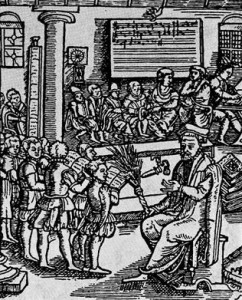 In order to give you the utmost flexibility in your choice of final assignments for this course, I offer you 3 ways to complete your coursework. Please choose ONE of the following options, to be turned in via email on the day the final would have been scheduled, May 8. The final project is due in my inbox by 11:59 pm.
In order to give you the utmost flexibility in your choice of final assignments for this course, I offer you 3 ways to complete your coursework. Please choose ONE of the following options, to be turned in via email on the day the final would have been scheduled, May 8. The final project is due in my inbox by 11:59 pm. 1. 10+ pp. Research Paper.
For this option, please choose a specific question related to Shakespeare Studies to research in detail. Your paper, while of course taking part in a preexisting scholarly conversation, will have an original thesis argument that you support with textual evidence from the relevant play/plays and at least 6 other works of scholarship.
2. Two Smaller Papers, approx 5 pp. each.
For this option, choose two of the following assignment options from the blog:
Lear Textual Study
Production Analysis
Word Study Paper: in order to do this paper, you may need to modify your study to include a close reading of a specific word within the context of Shakespeare's work, making a cogent argument about what you see the word doing during the period and in Shakespeare.
Reception Study
Source Study
3. For Teachers: Shakespeare Unit Design.
see this post for the assignment.

 A textual study:
compare a passage in the First Quarto with the corresponding one in the First
Folio, then glance at the conflated version. Do the differences change your
understanding of the passage? Which seems to fit the play’s overall energy and
message better, in your opinion? This exercise will require close reading and
critical thought.
A textual study:
compare a passage in the First Quarto with the corresponding one in the First
Folio, then glance at the conflated version. Do the differences change your
understanding of the passage? Which seems to fit the play’s overall energy and
message better, in your opinion? This exercise will require close reading and
critical thought. 